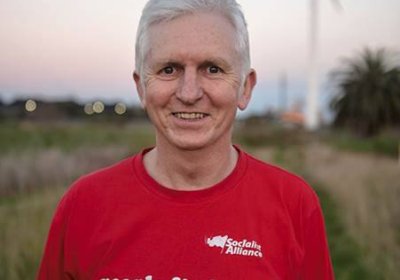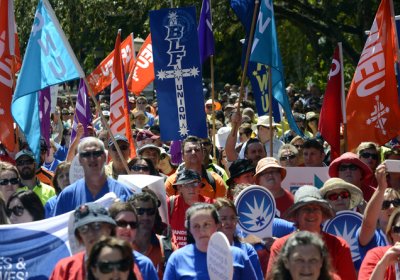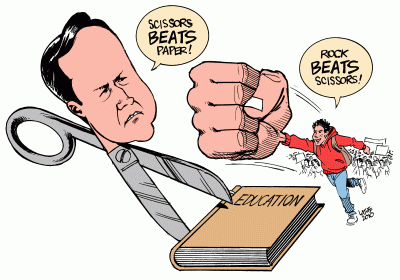Paul Verhaeghe, senior professor of clinical psychology and psychoanalysis at Ghent University in Belgium, has argued in a recently published essay that neoliberal economics brings out the worst in human beings.
He finds that thirty years of neoliberalism, and the privatisation and free-market misery that comes with it, have taken their toll on people’s values and even their personalities.
John Rainford
NSW ALP Senator John Faulkner, luminary of the Labor left, has been complaining of the structural flaws in the party for decades. Despite being a long-time beneficiary of the party’s factionalism, almost 10 years ago he was writing of the “shared venality” of party apparatchiks that led it back beyond factionalism. “It is feudalism, and it is killing the ALP.” Last week he was at it again in his address to the “Light on the Hill Society” at Revesby Workers Club in western Sydney.
When the Royal Commission into Trade Union Governance and Corruption was set up by the federal government, it was widely seen as a political witch hunt intended to smear the union movement with guilt by association to the scandals that had emerged in the Health Services Union (HSU).
With a bit of good fortune and a lot of spin-doctoring it would also provide the Coalition with handy ammunition against the ALP at the next federal election, likely to be held in late 2016 — a contrived “ticking Tampa”.
By the mid-1880s, all of the Australian colonies had passed education Acts based on the principal of “free, compulsory and secular” education. This mirrored similar legislation in Britain where the Factory Act of 1833 had made it unlawful for children under nine years of age to be employed in textile factories.
In 1878, the Factory and Workshops Act extended this to all factories and limited the working hours of children under 14 years of age.
Tony Abbott’s government has backed away from the ludicrous proposal to force unemployed people to apply for 40 jobs a month to receive the paltry Newstart allowance.
The proposal would have generated 30 million job applications a month for the 147,000 jobs available to the 746,000 unemployed. But it was not an attack of common sense that led to the decision — it came after 7000 protesting “cover letters” were sent to Employment Minister Eric Abetz, together with complaints from small businesses that they would be inundated with applications for non-existing jobs.
The Who Pays for our Common Wealth report into tax contributions by the S&P ASX 200, Australia’s 200 top stockmarket listed companies, has found that 84% of them paid less than the company tax rate of 30% in the period between 2004 and 2013. This amounts to $80 billion in forgone taxation revenue.
As well as forcing people to wait until the age of 70 before reaching the retirement age, the federal Coalition government also intends to push these septuagenarians into poverty.
The retirement pension for a single person is currently set at 27.7% of Male Total Average Weekly Earnings (MTAWE) and is indexed every six months. The National Commission of Audit set up by Treasurer Joe Hockey in October last year has conveniently provided the government with a recommendation to reduce this rate.
According to John Kenneth Galbraith, the economist who chronicled the Great Crash of 1929, the Great Depression did not actually end. Rather, it was swept away by World War II.
Something eerily similar seems to be happening with the global economy since the onset of the global financial crisis (GFC) six years ago.
The vice-chairperson of the US Federal Reserve, Stanley Fischer, said: “The global recovery has been disappointing … year after year we have had to explain from mid-year why the global growth rate has been lower than predicted as little as two quarters back.”
The charmed run before the courts enjoyed by John Gay, former chairperson of Tasmanian timber company Gunns, may soon be over.
Gunns became insolvent in 2012, owing investors more than $1 billion. The company had been in serious financial trouble since February 2010, when a director’s report detailing its falling revenue was made public.
Two months before the report was released, Gay used his inside knowledge of the company’s financial position to sell Gunns shares worth more than $3 million. He avoided what was thought at the time to be a loss of $800,000.
Forty per cent of Australians do not believe that democracy is the best form of government, the Lowy Institute found in a poll it conducted earlier this year.
The main reasons given were that what now passes for democracy is serving vested interests rather than the interests of people, and that there is no real difference between the two big political parties.
This is a perfectly logical reaction to the convergence of the major parties around the economic doctrine of neoliberalism.
Premier Mike Baird’s apology to the people of NSW, delivered after the resignation of two Newcastle Liberal MPs, is about as sincere as Treasurer Joe Hockey’s mea culpa to the poor.
Baird’s statement that the Liberal Party would not contest the byelections caused by the resignations — “we strongly believe we have forfeited our right to represent those electorates” — is also a political ploy. The only reason the Liberals are not standing is to avoid the humiliating loss they knew was coming.
The age of entitlement might be over for some, but the spooks are not among them. There are six security and intelligence services in Australia, the largest of which is the Australian Security Intelligence Organisation (ASIO).
In 2004, it was getting by with 700 staff and a budget of $150 million. Now it has a staff of 1780 with a budget of $600 million at their disposal.
- Previous page
- Page 8
- Next page





